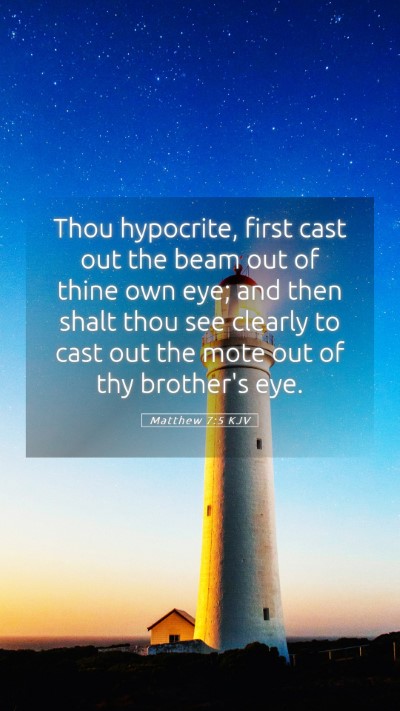Understanding Matthew 7:5: A Comprehensive Overview
Bible Verse: Matthew 7:5
Verse: "Thou hypocrite, first cast out the beam out of thine own eye; and then shalt thou see clearly to cast out the mote out of thy brother's eye."
Bible Verse Meaning
This verse serves as a profound reminder from Jesus about the necessity of self-examination and humility before correcting others. It highlights an essential principle of spiritual life: before one attempts to help another with their faults, they must first recognize and amend their own shortcomings.
Insights from Public Domain Commentaries
The interpretations by esteemed commentators such as Matthew Henry, Albert Barnes, and Adam Clarke provide valuable insights into this verse.
Matthew Henry's Commentary
Henry emphasizes the dangers of hypocrisy. He explains that the "beam" symbolizes large, obvious sins that one may overlook in oneself while fixating on the "mote" (a small speck) in another's eye. This not only reflects a lack of self-awareness but also a critical spirit. Henry encourages readers to prioritize personal righteousness over the judgment of others, advocating a humble approach to relationships.
Albert Barnes' Commentary
Barnes highlights the lessons of self-deception inherent in this verse. He points out that a hypocrite often fails to see his faults while being eager to point out the flaws in others. He advises that true judgment requires an honest assessment of oneself first and underscores the importance of cleansing one's spirit before attempting to aid others.
Adam Clarke's Commentary
According to Clarke, this verse addresses the moral obligation to refrain from judging others while ignoring one's failings. He interprets the "beam" and "mote" metaphorically to illustrate the disparity in human flaws, emphasizing that correction should stem from personal integrity and a clear understanding of one's own flaws.
Significance in Biblical Context
This verse fits into a larger theme within the Sermon on the Mount, where Jesus teaches about the kingdom of heaven's values, which include mercy, humility, and self-reflection. The call to avoid hypocrisy reinforces the importance of authentic faith and integrity in character.
Application of Matthew 7:5
In practical terms, this verse is a call to action for believers. Here are some applications:
- Self-Reflection: Regularly assess your actions and motivations. Ask yourself if you are holding others to a standard that you do not apply to yourself.
- Cultivating Humility: Approach all interactions with understanding and compassion. Recognize that everyone has struggles and that empathy is essential.
- Constructive Help: When helping others, do so from a place of integrity and love, having first worked on your own issues rather than from a position of superiority.
Bible Cross References
- Luke 6:41-42: Offers a parallel teaching on judging others, reinforcing the idea of self-examination before pointing out the faults of others.
- James 4:12: Discusses the role of God as the true judge, emphasizing our need to refrain from judgment.
- Galatians 6:1: Encourages believers to restore one another gently, highlighting the importance of humility.
Conclusion
Matthew 7:5 is a crucial teaching that challenges us to confront our own issues before attempting to correct those of others. This approach not only fosters personal growth but also cultivates a compassionate and supportive community among believers. For anyone seeking to deepen their understanding of this verse, engaging with various interpretations can enhance one's appreciation of its significance and practical applications in daily life.


